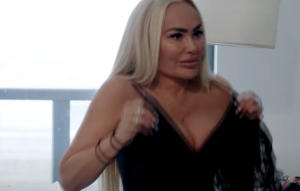In the sultry backdrop of Bulgaria, where tradition holds a firm grip on daily life and appearances speak louder than words, a storm brews quietly but fiercely between Darcey and Georgi, two souls connected by love yet divided by differing worldviews. The drama unfolds in a tension-ridden scene as Georgi implores Darcey to tone down her flamboyant style, fearful of how her revealing dress and bold fashion choices might be perceived by his conservative family and community. His words are sharp and charged with a mix of protectiveness and frustration, branding her revealing clothes as provocative and disrespectful, accusing her of risking their reputation by dressing in a way he deems inappropriate for Bulgaria’s modest social norms. This clash is not just about clothing but about identity, acceptance, and the delicate dance of blending two vastly different cultures under the veil of marriage.
Darcey, on the other hand, feels suffocated by his demands and misunderstood in her intentions. She tries to show progress, having toned down her eyelashes—a small but significant gesture for her—but Georgi barely acknowledges her efforts. The emotional weight of his critiques cuts deep, revealing an underlying fear that overshadows his love: the dread of judgment from his family and community, which might not only hurt him but also stain Darcey’s image as his wife. The dialogue is fraught with tension as they tread a tightrope between personal freedom and social conformity. Georgi’s worries about the impression Darcey will leave on his parents and friends underscore the harsh reality of cross-cultural relationships where the stakes are as much about external acceptance as internal harmony.
Yet, beneath the harsh words and the visible discord, there lies a yearning for understanding. Georgi’s plea is rooted in his vulnerability; he is overwhelmed by the prospect of exposing Darcey to a culture where the rules are different, and deviations are harshly judged. He asks her to see his perspective, to grasp the gravity of how appearances in Bulgaria convey respect and social standing. His insistence that Darcey cover up, tone down and adjust her behavior isn’t mere control—it’s a desperate attempt to shield their relationship from the harsh glare of scrutiny. This scene captures the raw essence of cultural clash, where love must navigate through ingrained traditions and expectations, leaving both parties grappling with how much they should change or compromise.
The emotional crescendo hits when Georgi’s frustration peaks, and his language turns harsh, calling Darcey derogatory names to emphasize how precarious her situation feels to him. This moment is painful but revealing: it shows how fear can morph love into something conflicted and confusing. Darcey’s silence and her subtle resistance express the inner turmoil of a woman caught between loyalty to her love and the desire to remain authentic to herself. The conflict doesn’t resolve neatly but rather simmers, highlighting the ongoing complexity of their relationship as they prepare for a trip where these tensions will only intensify under the watchful eyes of Georgi’s family.
This poignant drama encapsulates the trials and tribulations faced by couples who cross cultural boundaries, where love must not only conquer distance and language but the invisible lines drawn by social customs and personal insecurities. It exposes the fragile balance between self-expression and acceptance and invites the viewer to ponder the sacrifices made in the name of love. In this clash between Darcey and Georgi, there is no villain, only two people striving to find common ground in a world that insists on differences, making their story both heart-wrenching and compellingly real.





